News from Maison de la Gare
Two Tales of Transformation
Tweeter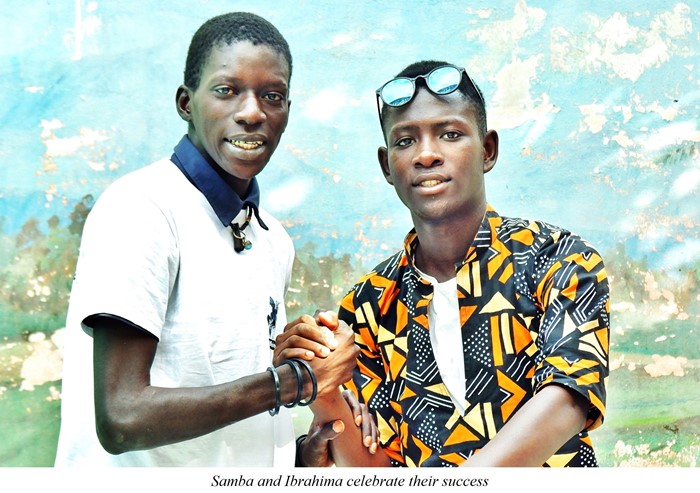
The story of each successful apprentice is a small miracle
We recently shared with you the encouraging progress made in our sewing apprenticeship program,
with eleven talibé youth completing the program and being set on their paths to self-sufficiency
(“A Chance at Life” at this link).
The story of each of these boys is a
tribute to their courage in triumphing over unbelievable adversity, true stories of
transformation and of the victory of hope over despair. The tales of two of these aspiring
entrepreneurs are recorded here.
Samba
Samba was born to a very poor family living in Casamance in the south of Senegal and was sent to learn
the Koran in a daara in Saint Louis at a very young age. He has an independent spirit and refuses to
give in to the abuse and repression he suffers in his daara. Samba does not want to be in his abusive
daara, and he does not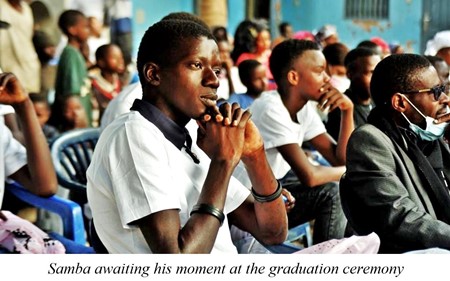 want to go home either as he says that his parents will simply send him back to
the daara since the marabout is his mother's uncle.
want to go home either as he says that his parents will simply send him back to
the daara since the marabout is his mother's uncle.
Samba's marabout is very harsh and forces him to beg for a daily quota of money. He is regularly beaten
and is deprived of nutrition, medical treatment, formal education and adequate shelter. He is severely
psychologically intimidated.
Samba had been introduced to Maison de la Gare’s center by other talibé children and loved going there.
He participated regularly in soccer games and had begun training in the karate program. However, his
marabout forbade him to participate in these programs and confiscated his karate uniform. Samba persisted
in coming to the center however, calling it the only joy in his life. He was repeatedly treated for
his injuries in Maison de la Gare’s infirmary.
Finally, Samba ran away, unable to tolerate any longer the severe abuse that he suffered in his daara.
His parents refused to accept him coming home, so he had nowhere to go and spent many days and nights
alone and dangerously 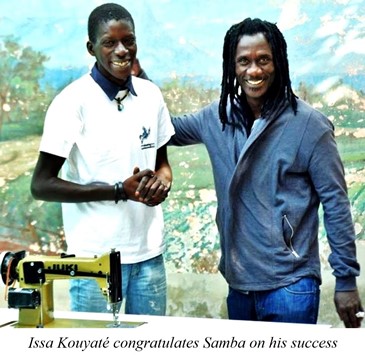 exposed on the street. This is where Maison de la Gare’s team found him, after
someone had reported seeing him alone sleeping under the hot sun.
exposed on the street. This is where Maison de la Gare’s team found him, after
someone had reported seeing him alone sleeping under the hot sun.
Samba was taken to our emergency shelter and spent many days there recovering from his ordeal. After
our street educators had gained his confidence, he told them that he wanted to participate in the
sewing program because his first ambition had always been to become a great tailor. He was enrolled
into the GO Campaign program. Maison de la Gare met with his marabout and obtained his agreement.
Samba returned to his daara and is living there, with regular monitoring by Maison de la Gare’s staff
to ensure that the severe abuse does not happen again.
Samba came faithfully to Maison de la Gare’s center to participate in the program, avoiding his daara
as much as possible. He has been a quiet but very good student, learning quickly and well. Maison
de la Gare has become his family, healing his wounds and providing comfort and psychological support
in his very difficult life. Sewing has become a passion for him, allowing him to focus and find
a purpose. He says: “I want to become as good as my instructor Baka. After the training, I will
lead workshops and help children who need it."
Samba is very ambitious and made great progress in the tailoring program. He got excellent marks in
the assessments and looks forward to the future and to being able to take care of his mother.
Ibrahima
Ibrahima was born in Gambia to a father who is now a mechanic living in Dakar and a mother who sells
products in the market in Saint Louis. He was found asleep in the market
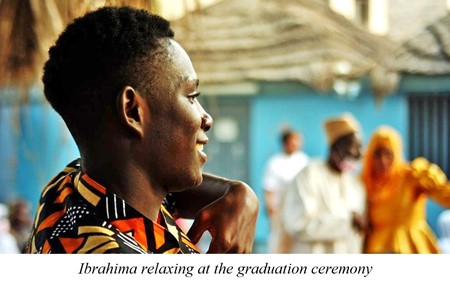 by Maison de la Gare’s
night rounds team, covered with empty rice bags. The team took him to Maison de la Gare’s emergency
shelter, where our street educators worked with him patiently to learn his story.
by Maison de la Gare’s
night rounds team, covered with empty rice bags. The team took him to Maison de la Gare’s emergency
shelter, where our street educators worked with him patiently to learn his story.
Ibrahima is the eldest of six children from several different fathers. He grew up in Gambia with
his maternal grandmother until the age of five, when he was sent to Louga to a maternal aunt where
he stayed for several years.
Ibrahima’s mother had moved to Saint -Louis, but she could not take care of him due to the number
of children and her small income from selling fresh water and juice in the market. He was sent to
a daara in the Darou area of Saint Louis. He found the conditions there intolerable and was often
not able to beg for enough money to satisfy the daily quota that his marabout demanded of him. His
only refuge was the street.
Ibrahima’s daara was particularly bad, with no doors, windows or light, and located in a dangerous
area without security. During the winter season, the children were left to fend for themselves
without protection from 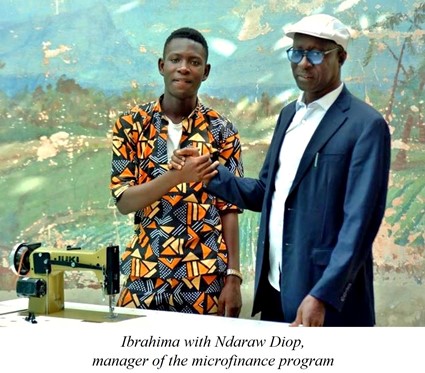 the cold while the marabout lived next door. Because of these conditions,
Ibrahima ran away repeatedly, leading to our night rounds team finding him in the market.
the cold while the marabout lived next door. Because of these conditions,
Ibrahima ran away repeatedly, leading to our night rounds team finding him in the market.
Ibrahima began to get involved in our programs after a few days at Maison de la Gare’s center,
playing in the yard with other talibés and talking with our staff. Our team found that he was very
polite, and courageous about his situation. He saw the apprentices involved in the sewing program
and wanted very much to be involved. He was accepted into the program and worked very diligently
and successfully. Thanks to this program, Ibrahima now has a promising future.
In his words: "It was not easy for me because neither my father nor my mother supported me or
cared about me. I spent years in the daara and on the streets, fending for myself. Now, thanks
to this project, I have been able to find my place in society. I hope to become a great tailor
and be able to help my mother, who does not have the means to support herself.”
_______________
Thank you again to GO Campaign of California for their grant that made Samba and
Ibrahima’s program possible, and to all our donors who continue to support us and who
will make it possible for many more youth to follow in Samba and Ibrahima’s footsteps.
Samba and Ibrahima’s names, and their regions of origin, have been
changed in this report.

